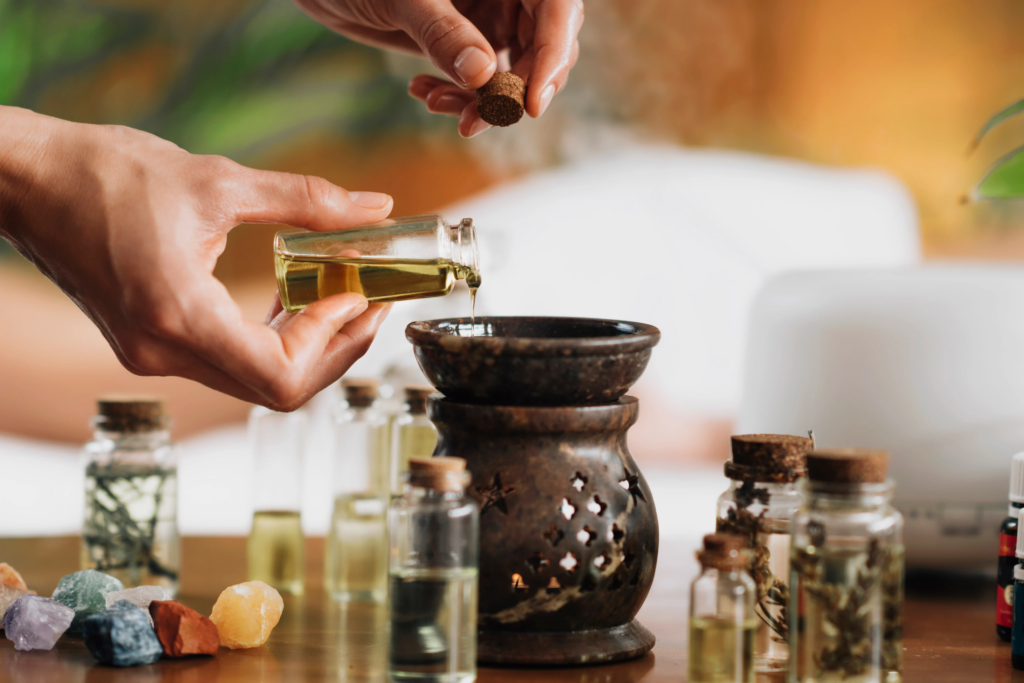A fragrant journey awaits, weaving through the corridors of time and science, to explore the symbiotic relationship between aromatics and skin health.
Just as music has the power to elicit emotions, scents have the innate ability to trigger memories and affect our well-being.
In this exploration, we’ll delve deep into the art and science of aromatherapy, unveiling its potent potential for skin care and beauty.
The Role of Scent in Emotional Well-being

Odors have a unique connection with our emotional state, shaping moods and invoking memories. The olfactory bulb, which processes these odors, connects directly to the areas of the brain responsible for emotions and memories.
This direct link explains why a simple fragrance can transport us back to our grandmother’s kitchen or a cherished childhood location.
Yet, this association isn’t mere nostalgia; it has physiological implications too. The scent of a gender neutral perfume affects our emotions, it can indirectly impact hormonal balance, stress levels, and overall well-being.
The right aroma can soothe, invigorate, and even restore – ensuring our emotional equilibrium remains intact.
Aromatherapy’s Impact on Skin Health
The skin, our protective shield, often mirrors our inner health. Stress, for instance, can manifest as breakouts or dullness.
Herein lies aromatherapy’s power. As certain fragrances alleviate emotional strain, they can inadvertently enhance skin health, reducing the physical signs of stress or anxiety.
Beyond these indirect effects, many aromatic compounds exhibit direct benefits for the skin. Chamomile’s calming scent, for instance, can soothe both the mind and inflamed skin.
Lavender, revered for its relaxing properties, also aids in skin regeneration, making it a dual-action star in the world of beauty.
Essential Oils: Nature’s Potent Aromatherapeutic Agents
Delving into nature’s pharmacy, we uncover essential oils – concentrated extracts from plants, flowers, and herbs. These oils encapsulate the essence of their source, providing both aromatic and therapeutic properties.
Take tea tree oil, its distinct scent is not just refreshing but its compounds actively combat skin bacteria, making it a favorite for acne-prone complexions.
On the other hand, rose oil, with its luxurious, romantic fragrance, is not only a mood enhancer but is laden with vitamins, minerals, and antioxidants. This oil is often sought for its anti-aging benefits, promoting a youthful, radiant complexion.
Understanding the Science Behind Aromatherapy

Aromatherapy isn’t just about pleasant odors. It’s a complex blend of chemistry and biology. The active components in essential oils, such as terpenes, alcohols, and esters, interact with biological systems, leading to tangible skin benefits.
For instance, the terpenes in certain oils possess strong anti-inflammatory properties.
The method of extraction plays a crucial role in preserving these compounds. Steam distillation, for instance, ensures that the heat-sensitive components remain intact.
This intricate dance between science and nature ensures the oils retain their therapeutic potency.
Incorporating Aromatherapy into Daily Skin Care Routine
Embracing aromatherapy in daily rituals can be transformative. Morning routines can include invigorating scents like peppermint or citrus to awaken and refresh, while evening rituals may lean towards calming fragrances like lavender or ylang-ylang to wind down.
Facial oils infused with aromatic extracts not only provide hydration but also introduce the benefits of aromatherapy to your regimen. These can be massaged gently, allowing both the skin and senses to absorb their magic.
Matching Scents to Skin Types and Concerns
Customizing fragrances to skin needs can amplify benefits. For dry skin, sandalwood or geranium offers moisturizing properties, while those with oily complexions might benefit from the balancing nature of lemongrass or juniper berries.
Sensitive skin might resonate with the calming nature of chamomile or rose, providing relief from redness and irritation.
Recognizing these scent-to-skin matches can elevate your beauty routine, making it uniquely tailored.
Synergy of Aromatherapy and Topical Treatments
It’s exciting when aromatherapy complements other treatments. For instance, after a deep exfoliation, a frankincense-infused moisturizer can offer anti-inflammatory benefits while calming the senses. Or, post a laser treatment, lavender can expedite healing.
This synergy isn’t coincidental. It’s the result of careful research and understanding of how aromatic compounds augment the effects of traditional topical treatments, providing a holistic approach to beauty.
Safety Guidelines for Using Essential Oils on Skin
While essential oils promise wonders, they must be used judiciously. Their concentrated nature means they can irritate if applied undiluted.
A patch test can help ascertain skin’s compatibility. For topical applications, diluting them in carrier oils like jojoba or almond oil is recommended.
Eyes, inner ears, and mucous membranes should be avoided. Pregnant or nursing individuals and those on medications should consult professionals before incorporating essential oils into their regimen.
Case Studies: Success Stories of Aromatherapy in Skin Care
Real-life narratives underscore aromatherapy’s impact. Jane, a 28-year-old with eczema, found relief in a blend of chamomile and calendula. Not only did her flare-ups diminish, but she also experienced a newfound emotional calm.
In another case, Michael, battled persistent acne until he integrated tea tree oil into his routine, witnessing not just clearer skin but boosted confidence.
These stories aren’t anomalies. They highlight the transformative potential of integrating aromatic wisdom with skincare.
Aromatherapy in Spa and Professional Skin Treatments
Leading spas and beauty clinics have recognized the potency of aromatherapy. Facials now often begin with scent-based relaxation, setting the tone for the treatment.
Certain deep-cleansing treatments incorporate eucalyptus, capitalizing on its antiseptic qualities.
These professional spaces harmonize the restorative powers of fragrances with advanced skin treatments, giving clients an encompassing, rejuvenating experience.
Exploring Cultural and Historical Use of Aromatics in Skin Care
Journeying through time, one finds that ancient civilizations like the Egyptians and Greeks harnessed the power of aromatic plants for beauty.
Queen Cleopatra famously bathed in rose petals, tapping into its hydrating and anti-aging properties. Similarly, in ancient India, turmeric, with its distinct aroma, was used for its antiseptic and beautifying properties.
Such practices underscore that the union of scent and skincare isn’t a modern invention. It’s an age-old relationship, replete with wisdom that we’re only beginning to fully appreciate.
Final Thoughts
Embarking on this aromatic voyage underscores a fundamental truth: our senses are intricately tied to our well-being. Aromatherapy, in its fusion with skincare, is not just about external beauty.
It’s a holistic dance, where scents nourish the soul while nurturing the skin. As we journey forward in our beauty rituals, let’s carry the essence of this ancient wisdom with us, cherishing the harmony of scent, soul, and skin.

Jean Smith is a fitness enthusiast and blogger who focuses on fitness and a healthy lifestyle. She is passionate about assisting people in living healthier lifestyles and is constantly on the lookout for new and creative methods to stay fit and healthy. Her articles are excellent resources for anyone interested in improving their health and fitness.
